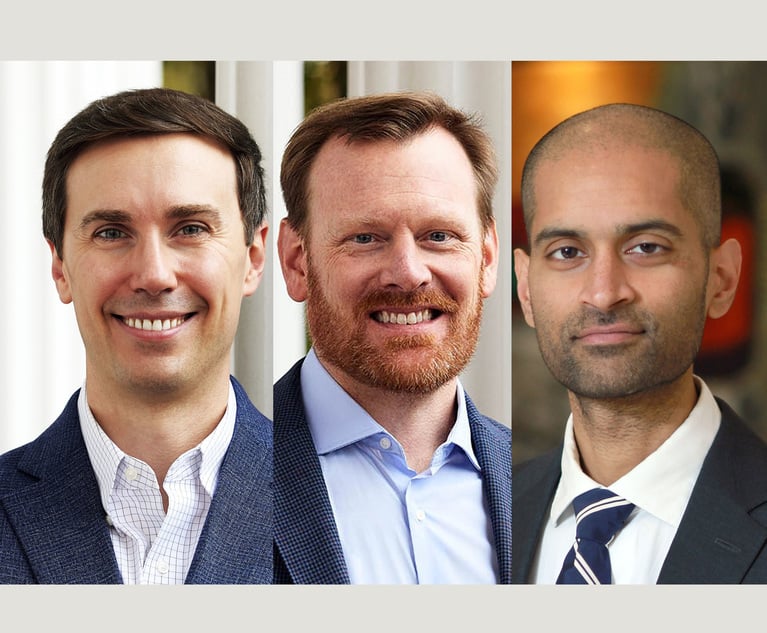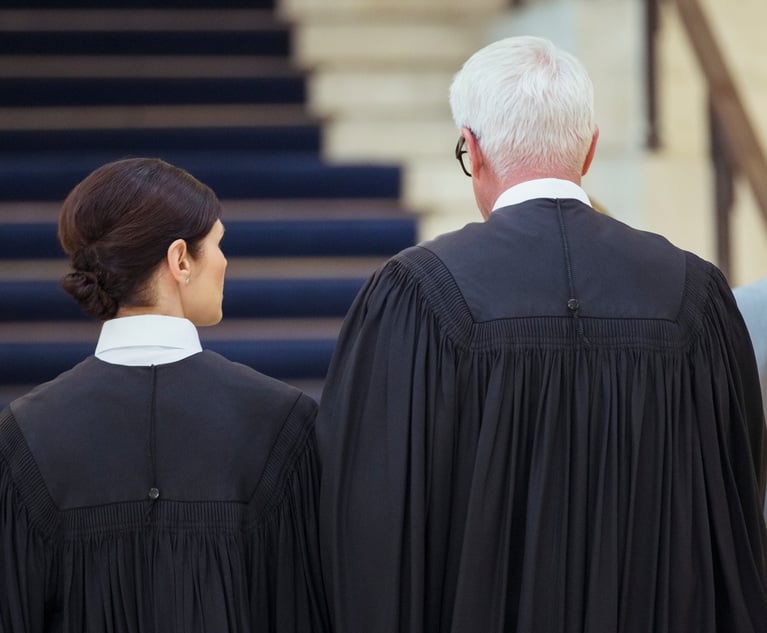Charge It? Not to Pay Bankruptcy Lawyers, 11th Circuit Says
Ruling in a putative class action against a defunct Orlando law firm, a panel said an attorney violates federal law "if he instructs a client to pay his bankruptcy-related legal fees using a credit card."
April 06, 2018 at 12:38 PM
6 minute read

Note to lawyers advising clients considering bankruptcy: Tell them to keep that plastic in their wallets.
In a ruling likely to resonate with bankruptcy and debt relief lawyers, the U.S. Court of Appeals for the Eleventh Circuit ruled an attorney violates federal law “if he instructs a client to pay his bankruptcy-related legal fees using a credit card.”
The published opinion released March 30 reversed a trial judge and reinstated a putative Florida class action against the Orlando law firm Kaufman, Englett & Lynd filed by a former client. The Orlando Sentinel reported the firm dissolved in April 2016 after the suit was filed.
The panel found an attorney who advised his client to “incur more debt” by charging his legal fees on a credit card runs afoul of the Bankruptcy Abuse Prevention and Consumer Protection Act of 2005 (BAPCPA).
The opinion, authored by Judge Kevin Newsome with the concurrence of Chief Judge Ed Carnes and Sixth Circuit Judge Eugene Siler Jr., sitting by designation, also rejected the defendant's claim that the law's provision is an unconstitutional violation of the First Amendment because it restricts attorney-client communication.
Bryan Mickler, the attorney for plaintiff Lloyd Cadwell, was not available for comment by deadline. His father and law partner, Albert Mickler of Jacksonville's Mickler & Mickler, said the decision should not impact most bankruptcy attorneys.
“But if the Eleventh Circuit had ruled the other way, it would have resulted in a vast amount of problems,” Albert Mickler said. “Imagine this scenario: A person comes in and wants to file for bankruptcy, and the lawyer says, 'Alright, just pay with your credit card. I'll take $2,500.'”
“That person would be committing fraud, ” he said, “ and so would the attorney, because they're making a charge knowing they never intend to pay that credit card.”
The attorney representing Kaufman Englett, Adam Herman of Marshall, Dennehey, Warner, Coleman & Goggin in Orlando, declined to discuss the case and said the opinion was being reviewed.
“We're looking at all options,” he said.
As detailed in the opinion and filings in the underlying case, the dispute began when Cadwell consulted Kaufman Englett in January 2016 about filing a bankruptcy petition. The retainer agreement included $1,700 in attorney fees, which were broken down into monthly installments of $250 and $300.
Cadwell charged the installments on two credit cards “for the express purpose of paying the fees and charges” related to the bankruptcy, causing him “to incur more debt in contemplation of filing the Chapter 7 case,” his complaint said.
In 2016, Cadwell sued Kaufman Englett in the Middle District of Florida, asserting the law firm “uses standardized procedures when attempting to collect attorney's fees by charging credit cards prior [to] filing Chapter 7 bankruptcy,” causing “a prospective debtor to incur more debt prior to filing” for bankruptcy protection.
The complaint did not specify the size of the proposed class but said it “exceeds several hundred Florida consumers.”
The complaint said Kaufman Englett violated a section of the Bankruptcy Code that does not allow a debt relief agency—including a law firm—to “advise an assisted person or prospective assisted person to incur more debt in contemplation of such person filing a case under this title or to pay an attorney or bankruptcy petition preparer a fee or charge for services performed as part of preparing for or representing a debtor in a case under this title.”
In response, the law firm argued the “mere advice to use a credit card to pay fees, without any accompanying improper motivation, does not create a cause of action.”
The U.S. Supreme Court's 2010 ruling in Milavetz Gallop & Milavetz v. United States, 559 U.S. 229, “only precluded an attorney from advice where the purpose was to incur more debt in order to discharge the debt,” Kaufman Englett maintained.
The statute also violates the First Amendment, because it “clearly discriminates against the content of the attorney's dialogue by precluding the attorney from advising the client to make payment by credit card for retainer fees, regardless of the reasoning,” the firm argued.
In 2017, U.S. District Judge Paul G. Byron dismissed the case, ruling the bankruptcy abuse law only prohibits “advising a debtor to incur additional debt for an invalid purpose.”
“It is customary for bankruptcy attorneys to expect compensation for legal services provided to debtors in contemplation of bankruptcy,” the judge wrote. “Thus, without more, the mere advice to use credit cards to pay for legal fees does not violate the BAPCPA.”
Byron did not address Kaufman Englett's First Amendment claims and denied Cadwell's motion to certify the class as moot.
On appeal, the law firm reiterated that the law only prohibited advising a client to incur debt for an “invalid purpose,” but the appellate panel said that was a misinterpretation of the law.
The first portion of the relevant code section bars advising a client to incur debt “in contemplation of” a bankruptcy filing, Newsome wrote.
But the second section, he continued, “is aimed at one specific kind of conduct—in essence, a bankruptcy lawyer saying to his client, 'You should take on additional debt to pay me!' That sort of advice is inherently abusive in at least two respects. First, it puts the attorney's financial interest—getting paid in full—ahead of the debtor-client's.”
Newsome added, “It puts the lawyer's own interests ahead of the creditors' in that, while ensuring the lawyer's full payment, it leaves a diminished estate on which creditors can draw.”
Byron “erred in concluding that Cadwell was required to allege that [Kaufman Englett]'s advice was given for some additional, invalid purpose.”
Newsome then turned to the constitutional argument.
The law firm's “primary argument is that 'prohibiting advice to clients to pay a fee' violates the First Amendment,” he said. But “Cadwell hasn't asserted—and we don't hold hold—that the statute flatly prevents a lawyer from advising a client to pay legal fees.”
It “merely prohibits them from giving their clients 'affirmative advice' to incur more debt in order to pay for bankruptcy-related representation.” the court said.
This content has been archived. It is available through our partners, LexisNexis® and Bloomberg Law.
To view this content, please continue to their sites.
Not a Lexis Subscriber?
Subscribe Now
Not a Bloomberg Law Subscriber?
Subscribe Now
NOT FOR REPRINT
© 2025 ALM Global, LLC, All Rights Reserved. Request academic re-use from www.copyright.com. All other uses, submit a request to [email protected]. For more information visit Asset & Logo Licensing.
You Might Like
View All

Spalding Jurors Return $12M Verdict Against State Farm Insurance Client
10 minute read

Trending Stories
- 1Holland & Knight Picks Up 8 Private Wealth Lawyers in Los Angeles
- 2Khan Defends FTC Tenure, Does Not Address Post-Inauguration Plans
- 3J.D. Vance Campaign Finance Challenge Leads December Supreme Court Petition Roundup
- 44th Circuit Revives Racial Harassment Lawsuit Against North Carolina School District
- 5Alston & Bird, Baker Hostetler, Holland & Knight Promote Partners in Southeast
Who Got The Work
Michael G. Bongiorno, Andrew Scott Dulberg and Elizabeth E. Driscoll from Wilmer Cutler Pickering Hale and Dorr have stepped in to represent Symbotic Inc., an A.I.-enabled technology platform that focuses on increasing supply chain efficiency, and other defendants in a pending shareholder derivative lawsuit. The case, filed Oct. 2 in Massachusetts District Court by the Brown Law Firm on behalf of Stephen Austen, accuses certain officers and directors of misleading investors in regard to Symbotic's potential for margin growth by failing to disclose that the company was not equipped to timely deploy its systems or manage expenses through project delays. The case, assigned to U.S. District Judge Nathaniel M. Gorton, is 1:24-cv-12522, Austen v. Cohen et al.
Who Got The Work
Edmund Polubinski and Marie Killmond of Davis Polk & Wardwell have entered appearances for data platform software development company MongoDB and other defendants in a pending shareholder derivative lawsuit. The action, filed Oct. 7 in New York Southern District Court by the Brown Law Firm, accuses the company's directors and/or officers of falsely expressing confidence in the company’s restructuring of its sales incentive plan and downplaying the severity of decreases in its upfront commitments. The case is 1:24-cv-07594, Roy v. Ittycheria et al.
Who Got The Work
Amy O. Bruchs and Kurt F. Ellison of Michael Best & Friedrich have entered appearances for Epic Systems Corp. in a pending employment discrimination lawsuit. The suit was filed Sept. 7 in Wisconsin Western District Court by Levine Eisberner LLC and Siri & Glimstad on behalf of a project manager who claims that he was wrongfully terminated after applying for a religious exemption to the defendant's COVID-19 vaccine mandate. The case, assigned to U.S. Magistrate Judge Anita Marie Boor, is 3:24-cv-00630, Secker, Nathan v. Epic Systems Corporation.
Who Got The Work
David X. Sullivan, Thomas J. Finn and Gregory A. Hall from McCarter & English have entered appearances for Sunrun Installation Services in a pending civil rights lawsuit. The complaint was filed Sept. 4 in Connecticut District Court by attorney Robert M. Berke on behalf of former employee George Edward Steins, who was arrested and charged with employing an unregistered home improvement salesperson. The complaint alleges that had Sunrun informed the Connecticut Department of Consumer Protection that the plaintiff's employment had ended in 2017 and that he no longer held Sunrun's home improvement contractor license, he would not have been hit with charges, which were dismissed in May 2024. The case, assigned to U.S. District Judge Jeffrey A. Meyer, is 3:24-cv-01423, Steins v. Sunrun, Inc. et al.
Who Got The Work
Greenberg Traurig shareholder Joshua L. Raskin has entered an appearance for boohoo.com UK Ltd. in a pending patent infringement lawsuit. The suit, filed Sept. 3 in Texas Eastern District Court by Rozier Hardt McDonough on behalf of Alto Dynamics, asserts five patents related to an online shopping platform. The case, assigned to U.S. District Judge Rodney Gilstrap, is 2:24-cv-00719, Alto Dynamics, LLC v. boohoo.com UK Limited.
Featured Firms
Law Offices of Gary Martin Hays & Associates, P.C.
(470) 294-1674
Law Offices of Mark E. Salomone
(857) 444-6468
Smith & Hassler
(713) 739-1250






